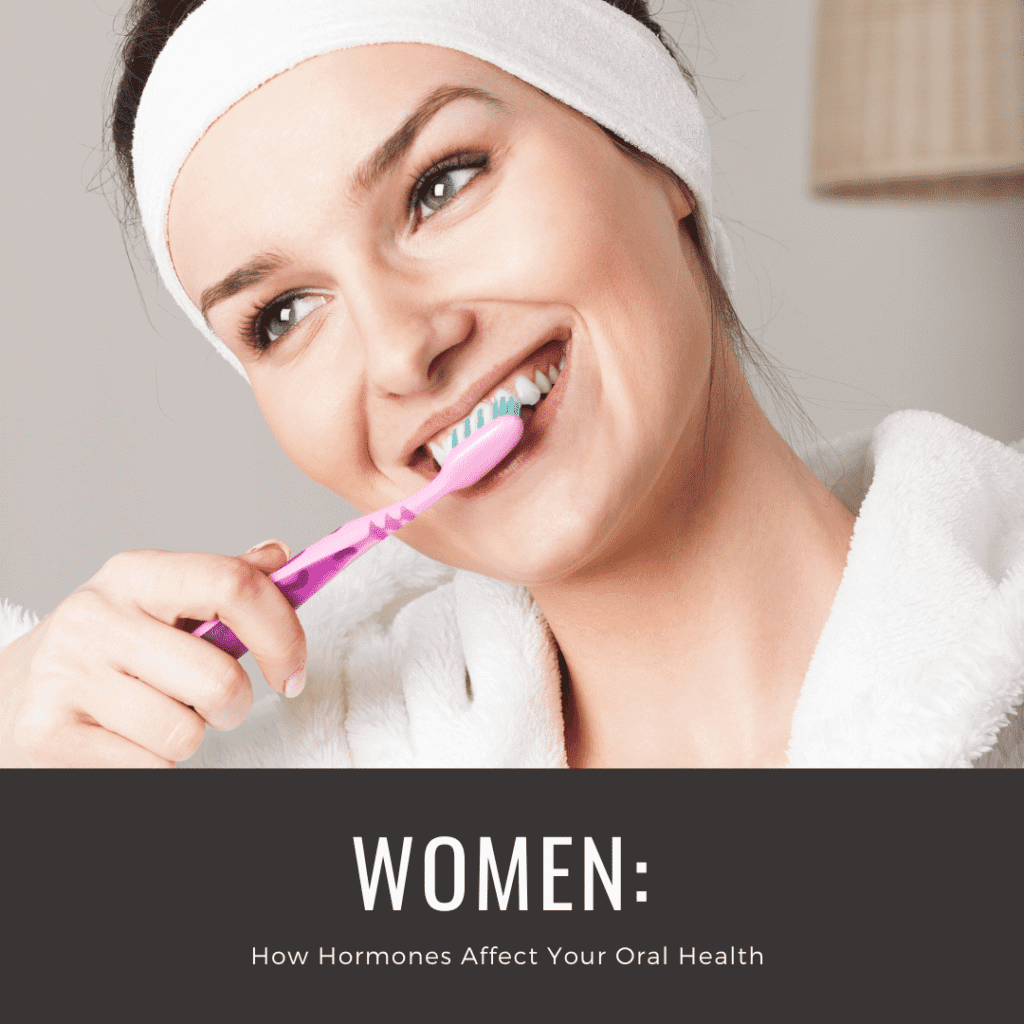In honor of National Women’s Health Week, which is May 9th-15th, we would like to explore the relationship between hormones and women’s oral health. Hormones are produced by the body as chemical messengers responsible for initiating various functions or actions. Despite the fact that men and women have the same hormones, each sex produces hormones differently, has different amounts of particular hormones, and uses hormones differently. This is why women have slightly different oral health needs when compared to men.
One main reason why a woman’s hormones affect her oral health is due to the higher levels of estrogen and progesterone. Both of these hormones are primarily responsible for maintaining the female reproductive system, however they also affect the sensitivity of the gums. When estrogen and progesterone levels rise, this makes the gums more sensitive and responsive to plaque and bacteria along the gum line. This, in turn, means that the gums are more likely to “overreact” to plaque and bacteria by bleeding and becoming swollen and inflamed. In short, high levels of estrogen and progesterone can drastically increase the risk of gum disease.
There are five main stages during a woman’s life where her hormones play a particular role in her oral health. Knowing when these are can help you take preventative measures to maintain your oral health. These stages include:

Puberty
The first stage during a woman’s life where she is at an increased risk of gum disease is during puberty when estrogen begins to be produced by the hypothalamus. For some teenage girls, puberty can be accompanied by red and swollen gums that bleed easily when brushing, flossing, or eating. In some cases, canker sores, or small sores inside the mouth, can form during puberty as well, often just before menstruation. In fact, canker sores are quite common in teens, with women being affected twice as much as men.
Menstruation
The amount of estrogen and progesterone fluctuate all through the menstrual cycle. In the days leading up to your period as estrogen levels rise, you may notice that your gums are swollen and bleed easily, you develop canker sores in the mouth, and your salivary glands may even swell. When this happens, these symptoms generally last until your period ends. If you are planning a dental cleaning, it is recommended to wait until the week after your period to avoid any discomfort caused by increased sensitivity.
While Taking Birth Control
Nowadays, many women take birth control to prevent pregnancy and manage their periods. Although most birth control methods contain estrogen and progesterone (some only contain estrogen), the amount of hormones they contain is so low that it does not have an effect on your gums. However, it is still important to disclose to your dentist if you are taking birth control since it can affect your oral health in other ways. One way that birth control affects your oral health is by making you more likely to develop a dry socket after a tooth extraction. It is also helpful for your dentist to know that you are taking birth control in case they need to prescribe medications that could interfere with your birth control.
During Pregnancy

Most women know that when they are pregnant, their hormone levels fluctuate drastically. In fact, women are said to produce more estrogen during one pregnancy than they will during all the non-pregnant years of their life. Of course, with estrogen and progesterone levels being so high, many women develop what is known as pregnancy gingivitis. Pregnancy gingivitis is a mild form of gum disease that causes red, swollen gums that bleed. If left untreated, it can advance to a more serious form of gum disease and can even cause pregnancy complications such as low birth weight, preeclampsia, and premature birth. For these reasons, it is important to schedule regular dental exams and cleanings while pregnant.
Menopause
During menopause, estrogen levels drop. Just as increased estrogen levels can affect women’s oral health, so can a drop in estrogen. When estrogen levels drop, women have described feeling a burning sensation in their mouth, as well as changes in taste. However, the most concerning symptoms associated with a drop in estrogen are dry mouth and bone loss. Dry mouth occurs when saliva production is reduced and dramatically increases the risk of developing tooth decay and gum disease. Bone loss can also occur and could be a potential sign of osteoporosis. Since gum disease can also cause bone loss, it is important to maintain good oral hygiene, have frequent dental cleanings, and consume enough calcium and vitamin D.



